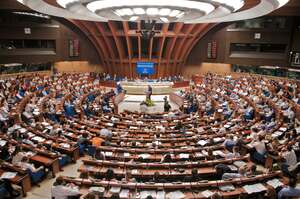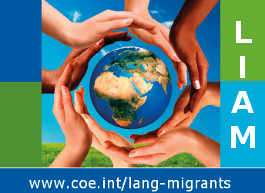Guiding principles

Effective respect for these fundamental principles requires a coordinated and principled approach to language policy which cuts across different domains of integration policy (social, employment, health...), and an awareness of the mutual rights and responsibilities of migrants and societies.
The Council of Europe has elaborated standard setting instruments and recommendations which set out the principles governing actions in the migration field. These are complemented by language policy guidelines and reference tools developed to support their effective implementation in an inclusive approach based on shared values and principles. [Ref. 1]
Drawing on these principles, agencies responsible for language policy are invited to consider the extent to which they:
- IMPLEMENT LANGUAGE PROGRAMMES THAT PROVIDE A CLEAR RESPONSE TO MIGRANTS’ LANGUAGE NEEDS FOR PERSONAL, SOCIAL AND WORKING LIFE; as migrants’ immediate and medium-term needs are identified, corresponding communicative objectives can be defined drawing on and adapting the scales of the 'Common European Framework of Reference for Languages' (CEFR) as required for eg addressing one’s children’s teachers, speaking to neighbours, writing a CV for a job, etc.; [Ref. 2]
- ENSURE THAT PROGRAMMES ARE SUFFICIENTLY OPEN TO ACCOMMODATE THE DIVERSITY OF MIGRANTS; there is no standard model as migrants can differ considerably in terms of their personal situation, their needs and capacities, prior educational and language learning history, time needed or available for learning the language; the form and phase of migration also varies depending, for example, on the intended duration of stay; [Ref. 3]
- SUPPORT MIGRANTS IN DEVELOPING INDEPENDENT LEARNING SKILLS; once the course is completed they will need to be able to manage their learning and acquire independently the competences they need to the level(s) required, at work, through building social networks, etc.; the European Language Portfolio (ELP) is designed to support the development of learning skills and can be used by migrants to relate their progress to the proficiency levels of the CEFR; [Ref. 4]
- MONITOR LANGUAGE AND CULTURE COURSES TO ENSURE THEY MEET INTERNATIONALLY ACCEPTED STANDARDS OF QUALITY ASSURANCE; the experience of effective tailor-made courses of a high quality, designed and delivered by properly trained professionals with the necessary facilities, may be more costly but provides value for money in terms of migrants’ attendance, motivation and learning outcomes; [Ref. 5]
- DEFINE REQUIRED PROFICIENCY LEVELS IN A REALISTIC AND FLEXIBLE MANNER THAT REFLECTS THE ACTUAL NEEDS AND CAPACITIES OF MIGRANTS; the CEFR can be used to define ‘profiles’ eg A2 level for spoken interaction, but A1 for reading or written interaction, rather than homogenous levels (A2 for all competences); in adapting the CEFR levels for official purposes such as residence or citizenship it is important to set realistic levels, bearing in mind that in most societies the majority of native speakers do not need to perform the tasks specified at the higher CEFR levels; the requirement to demonstrate a “sufficient” level or “good standard” in the official language is not only too vague to be useful but is based on the unproven assumption that successful integration depends on a given level of language proficiency; [Ref. 6]
- ENSURE THAT FORMAL TESTS, WHERE USED, CONFORM TO ACCEPTED STANDARDS OF QUALITY AND ARE NOT MISUSED TO EXCLUDE MIGRANTS FROM SOCIETY; where tests are used for official purposes such as residence or citizenship, they should be prepared by professional bodies to ensure that they are impartial, reliable and fair; however, there is no established relationship between passing a language test and successful integration; migrants can be well integrated and yet have limited language skills; language proficiency develops through real life use over time and therefore is not a precondition for, but rather a result of, participation in society; alternative forms of assessment such as the ELP provides evidence of what a learner can do in the language, and could complement or replace a test that is linked to the CEFR; [Ref. 7]
- DEVISE EFFECTIVE INCENTIVES RATHER THAN INEFFECTIVE SANCTIONS; TANGIBLE REWARDS FOR LANGUAGE LEARNING, SUCH AS SPEEDIER ACCESS TO EMPLOYMENT OR SOCIAL BENEFITS, PROVIDE ENHANCED MOTIVATION; however, sanctions that attempt to force migrants to learn can result in less effective learning and negative attitudes towards integration; disproportionate measures may be discriminatory and infringe the human rights of migrants; [Ref. 8]
- VALUE MIGRANTS’ LANGUAGES OF ORIGIN AND THEIR UNIQUE PLURILINGUAL AND PLURICULTURAL IDENTITIES; their languages of origin play an important role in the integration process; in a plurilingual and intercultural approach to language provision it is important to show that these languages are valued and encourage migrants to transmit them to their children in view of their importance as markers of identity and an asset for the whole of society. [Ref. 9]
Languages are an essential instrument for building intercultural understanding and social cohesion. The language or languages of the host society into which migrants are seeking to integrate, and the languages which are already part of their individual linguistic repertoire, shape their identities as active, democratic citizens. A plurilingual and intercultural approach to the teaching of the language of the host society ensures that languages become instruments of inclusion that unite rather than segregate people.
JS
* The Council of Europe uses the term ‘migrant’ to refer to all those who have migrated, including asylum seekers, those who have obtained refugees status or a similar type of protection, and so-called ‘economic migrants’. The International Organisation for Migration (IOM) defines a migrant as any person who is moving or has moved across an international border or within a State away from his/her habitual place of residence, regardless of the person’s legal status.
References
REF. 1: COUNCIL OF EUROPE POLICY
- White Paper on Intercultural Dialogue - Living Together As Equals in Dignity, 2008, Council of Europe, EN FR
- Concept Paper: The role of languages in policies for the integration of adult migrants, 2008, Jean-Claude Beacco EN FR
- Integration of Adult Migrants and Education: Extracts from Council of Europe Conventions, Recommendations and Resolutions (1968-2015) EN FR
REF. 2: LANGUAGE PROGRAMMES TO RESPOND TO NEEDS
- The ‘Common European Framework of Reference for Languages’ and the development of policies for the integration of adult migrants, 2008, David Little EN FR
- Language learning, teaching and assessment and the integration of adult immigrants. The importance of needs analysis, 2008, Piet van Avermaet, Sara Gysen EN FR
- Tailoring language provision and requirements to the needs and capacities of adult migrants, 2008, Hans-Jürgen Krumm / Verena Plutzar EN FR
See also Language courses & assessment, Richard Rossner
REF. 3: PROGRAMMES TO ACCOMMODATE THE DIVERSITY OF MIGRANTS
- Language Learning in the Context of Migration and Integration – Challenges and Options for Adult Learners, 2008, Verena Plutzar, Monika Ritter EN FR
- Living together in diversity - Linguistic integration in Flanders, 2008, Reinhilde Pulinx EN FR
REF. 4: DEVELOPING INDEPENDENT LEARNING SKILLS
- The linguistic integration of adult migrants and the ‘Common European Framework of Reference for Languages’, 2012, David Little EN FR
- Responding to the language needs of adult refugees in Ireland: an alternative approach to teaching and assessment, 2008, David Little EN FR
- Linguistic integration of adult migrants and the ELP: an introduction, 2012, David Little EN FR
- The European Language Portfolio for Adult Migrants: Learning the language of the host country, 2012, Barbara Lazenby Simpson (and related documents) EN FR IT
See also:
- Language policies for adult migrants : from values to education, Jean-Claude Beacco
- CEFR and Levels of proficiency, David Little
REF. 5: MEETING ACCEPTED STANDARDS OF QUALITY ASSURANCE
- Adult migrant integration policies: Principles and implementation (with an overview of papers), 2010, Jean-Claude Beacco EN FR
- Quality assurance in the provision of language education and training for adult migrants – Guidelines and options, 2008, Richard Rossner EN FR
- Responding to the language needs of adult refugees in Ireland: an alternative approach to teaching and assessment, 2008, David Little EN FR
See also Language courses & assessment, Richard Rossner
REF. 6: REALISTIC AND FLEXIBLE PROFICIENCY LEVELS
- The linguistic integration of adult migrants and the ‘Common European Framework of Reference for Languages’, 2012, David Little EN FR
- Education: Tailor-made or one-size-fits-all? A project commissioned by the Nederlandse Taalunie, 2008, ITTA/Elwine Halewijn, CTO/Annelies Houben, Heidi De Niel EN FR
See also:
- Language policies for adult migrants : from values to education, Jean-Claude Beacco
- CEFR and Levels of proficiency, David Little
REF. 7: QUALITY AND TRANSPARENCY OF FORMAL TESTS
- The Linguistic Integration of Adult Migrants: evaluating policy and practice (Reference Document for the conference held in 2010), David Little (ed.) EN FR IT
- Quality assurance in the provision of language education and training for adult migrants – Guidelines and options, 2008, Richard Rossner EN FR
- The role of literacy in the acculturation process of migrants, 2008, Hervé Adami EN FR
- Language tests for social cohesion and citizenship – an outline for policy makers, 2008, ALTE Authoring Group (Association of Language Testers in Europe) EN FR
The following language versions were kindly provided by ALTE members: BG DE IT NO - Providers of courses for adult migrants- Self-assessment Handbook, 2012, Richard Rossner EN FR IT SL
REF. 8: EFFECTIVE INCENTIVES RATHER THAN INEFFECTIVE SANCTIONS
- Concept Paper: The role of languages in policies for the integration of adult migrants, 2008, Jean-Claude Beacco EN FR
See also: Linguistic Profiles and profiling, Hans-Jürgen Krumm
REF. 9: VALUE MIGRANTS’ LANGUAGES OF ORIGIN




